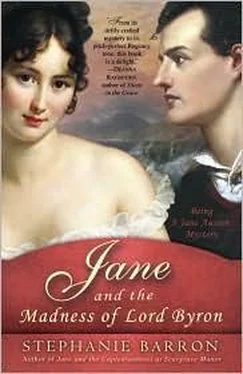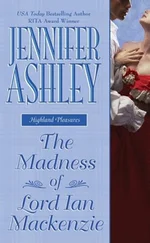“Miss Austen.” It was the Earl who greeted me, elegant as ever in evening dress. His smile was so warm that I wondered how I had ever thought him haughty, upon first acquaintance, in the Bath of our youth; perhaps nearly ten years of marriage had softened the ruthless opium trader he had once been. “It is very good of you to join us. Desdemona, I know, is most anxious to speak with you. Mr. Austen! As you see, the gentlemen — some of whom I believe are known to you — have by now rejoined the ladies; but pray allow me to fetch you a glass of Port!”
With merely a look, the Earl summoned a footman; Henry bowed to a tall, lean fellow with very little hair, and murmured, “Pleasure, Sir John — had thought you tied to Hertfordshire at this time of year — ” and I was claimed by Lady Swithin.
“Miss Austen,” she said as she curtseyed. “I am in your debt, dear creature. And I said nothing of this crush in my note to you! I feared you would not come, did you know we were encumbered with acquaintance this evening. Now, in penance for my sins, I shall make you known to only a few of these ladies — Miss Kemp, who is quite musical, and shall presently repair to the instrument, thereby allowing us to converse under cover of its noise; Mrs. Alleyn, who is so animated that no one may avoid her notice; and Mrs. Silchester, who acted as duenna to your unfortunate friend, Miss Twining.”
Mrs. Silchester! Here was a treasure, indeed!
I fixed a smile to my countenance; moved sedately under Desdemona’s guidance through the gauntlet of eyes, and found that Miss Kemp was of that uncertain age, when one does not know whether to hope for salvation in the form of an eligible parti; or accept the inevitable degradations of spinsterhood with private relief. She was, in short, approaching the age of danger, and should soon be at her last prayers. Her interest, therefore, was fixed upon such single gentlemen as the room afforded — a cousin of Swithin’s called Mr. Stanhope, and a dark-haired rake in his late thirties who went by the name of Hodge. If he possessed any other, I never learnt it. He was absorbed in casting dice, his right hand against his left — which, tho’ hardly the most genteel occupation for a drawing-room, appeared to be regarded as the merest commonplace by his intimates.
“So pleased,” Miss Kemp fluttered; “I hope you shall find Brighton to your liking.” Her gaze drifted continually over my shoulder, to follow the course of one gentleman or another through the crowd of her rivals.
“Augusta,” Desdemona said, “we are expiring for want of music. Would you be so good as to play an air or two upon the harp?”
“But if Miss Austen should care to exhibit — ?” she demurred.
“I know nothing of the harp,” I assured her. Of the pianoforte prominently positioned at one end of the room, I chose to say nothing. Miss Kemp fluttered over to her instrument, which was conveniently placed next to Hodge and his dice — fluttered a bit in composing herself to play — and allowed her fingers to flutter over the strings. At the first note, Hodge frowned — collected his dice in one sweeping movement — and repaired to the pianoforte, where he lounged in heated debate of tomorrow’s horse race with Mr. Stanhope.
Poor Miss Kemp.
Mrs. Alleyn, next in the gauntlet, was a vivacious widow who formed a principal part of Brighton’s charms, I was made to understand; her children being not yet out of the schoolroom, her fortune secured, and her taste for Society as rich as in her first girlhood, she was at liberty to accept as many invitations as the Season afforded — and in her case, these were many. She was the decided object of Sir John Stevenson’s gallantry — which, as Henry observed later, had much to do with her fortune of thirty thousand pounds, and explained why that gentleman was not tied to his estates in Hertfordshire at present.
“And so you are come down from London,” Mrs. Alleyn said. “How long a stay do you make in Brighton?”
“But a fortnight.” I glanced at Henry. “My brother, Mr. Austen, has been so unfortunate as to recently lose his wife; and we are here in an attempt to raise his spirits.”
“A widower!” She surveyed Henry with an appraising eye. “And in what part of the country are Mr. Austen’s estates?”
I stifled a smile. “My brother is a banker, ma’am, and thus fixed in London.”
Her interest waned.
“Mr. Austen is endlessly useful to Swithin,” Desdemona supplied, “and Lord Moira quite dotes upon him, I believe. But Miss Austen is an intimate friend of my girlhood, and knew my dear late grandmamma in Bath. I was so pleased to brush against her in Donaldson’s, and discover that she had come to Brighton for a bathing-cure.”
“Do you mean to try the machines?” Mrs. Alleyn asked, her eyes widening a little; “I should not attempt it before July, at the earliest — the water is far too cold for my taste in May. But perhaps that is part of the cure; the nerves are shocked into order by the frigidity of the plunge.”
“No doubt. Have you long been resident in Brighton?”
“Above five years. I removed here when my husband died — I was but a child, as you may conceive,” she added, self-consciously, tho’ I should never accuse her of being mutton dressed as lamb; she retained the bloom of youth, and looked several years my junior. “There is nothing like Brighton for banishing melancholy!”
“I had begun to wonder,” I suggested doubtfully. “The distressing news of Miss Twining’s death last evening — the probability of its being murder — very nearly convinced me to return to London! Such a town cannot be safe for unattached females! Poor Catherine, I said to my brother — To end in such a way!”
“You were acquainted with Miss Twining?” Mrs. Alleyn’s countenance was all interest.
“A little.”
“Ah,” she said with satisfaction. “Then you will be wishing to condole with Louisa Silchester. She is quite cut up, poor lady — tho’ not so melancholy as to avoid all society at present. Were she to hide in her rooms, the malicious might suspect her of negligence with regard to Miss Twining; and Louisa should never wish to forfeit the good opinion of Brighton. She cannot be held responsible for the girl’s death, — or not before the inquest, at least. Of the coroner’s opinion, we can as yet know nothing.”
“ — Or of General Twining’s, I presume? If he held Mrs. Silchester in trust — placed his daughter in that lady’s care — ”
“General Twining! Do not speak to me of that odious fellow!” Mrs. Alleyn cried. “He had the presumption to dangle after me, Miss Austen, a full twelvemonth, when first I came to Brighton; and his persistence could hardly be endured! I was forced to speak quite plainly to the gentleman, and assure him in the strongest language that we should not suit. I’ve long since cut my Wisdoms, my dear — and saw in an instant that fortune was the General’s first object! Female society is as nothing to him .” [17] “To cut Wisdoms” refers to the emergence of wisdom teeth—a phrase suggesting age, experience, and knowledge of the world. — Editor’s note.
“And has he proved inconsolable? Has any other lady excited his notice? Mrs. Silchester, perhaps?”
“My dear,” Mrs. Alleyn returned, “she has no money — and the General is entirely about interest . I am sure Louisa Silchester would have got him if she could — she was bosom-bows with his late wife from girlhood, I understand. The General is very sly — content to give his daughter into Mrs. Silchester’s charge — but nothing in the matrimonial line has come of it!”
Читать дальше












